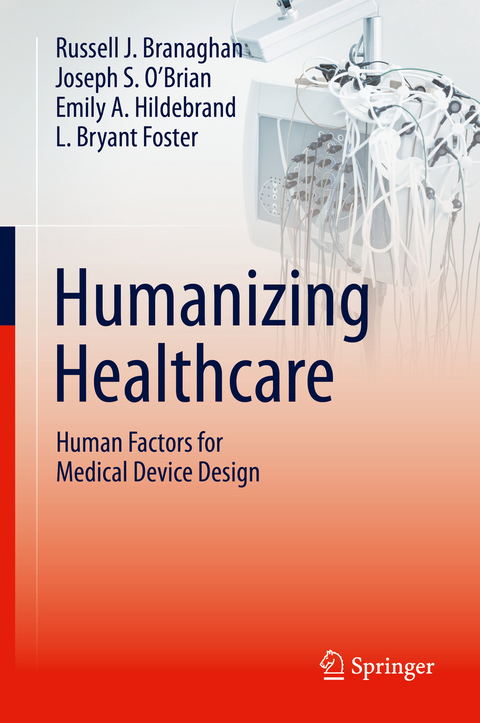
Humanizing Healthcare – Human Factors for Medical Device Design
Springer International Publishing (Verlag)
978-3-030-64432-1 (ISBN)
This hands-on professional reference is an essential introduction and resource for students and practitioners in HFE, biomedical engineering, industrial design, graphic design, user-experience design, quality engineering, product management, and regulatory affairs.
- Teaches readers to design medical devices that are safer, more effective, and less error prone;
- Explains the role and responsibilities of regulatory agencies in medical device design;
- Introduces analysis and research methods such as UFMEA, task analysis, heuristic evaluation, and usability testing.
lt;b> Russell J. Branaghan, PhD, has worked as a human factors engineer, research scientist, consultant and educator for over 30 years. He is President of Research Collective, a Human Factors and User Experience (UX) consulting firm and laboratory in Tempe, AZ. His work centers on healthcare human factors and user experience for leading companies in robotic surgery, cardiac rhythm management, diagnostic imaging, chronic disease management (e.g., hemophilia, diabetes), artificial organs, in vitro diagnostics, reprocessing, healthcare apps, wearables home health, and many others. Russ also serves as Associate Professor of Human Systems Engineering, Co-Director of the Master of Science in User Experience Program, and Director of the User Experience Laboratory (XLab) in the Ira A. Fulton Schools of Engineering at Arizona State University (ASU). He holds additional affiliations with the Kern Center for the Science of Healthcare Delivery at Mayo Clinic, the ASU-Mayo Center for Innovative Imaging, and the Master of Product Design and Development program at Northwestern University. His research has been funded by The National Science Foundation, Mayo Clinic, The Veterans Health Administration, Federal Aviation Administration, Air Force Research Laboratory, Office of Naval Research, Motorola and others. His teaching has been recognized with awards from ASU and Northwestern. Prior to returning to academics and consulting, Russ held leadership positions in human factors and user experience at Hewlett Packard, IBM, Fitch and Lextant Corporation. An active researcher, Russ has edited one book and published over 100 journal articles, book chapters, and conference proceedings. He frequently serves as a reviewer for scientific and medical journals, and has sat on many editorial and industry boards, including the Human Factors and Ergonomics Society (HFES) Product Design Technical Group, the Organizing Committee for the HFES Healthcare Symposium, the Editorial Board of the Journal of Human Factors, the Advisory Board for Mayo Clinic's Center for Innovation.
L. Bryant Foster, MS, is Vice President of Human Factors and User Experience at Research Collective, where he guides research, design, and evaluation efforts for medical device manufacturers, pharmaceutical companies, and others. An expert on regulatory issues in Human Factors, Bryant has guided surgical instruments, combination products, home-use devices, and OTC products to FDA clearance or approval. Further, he has designed, or contributed to the design of, usability labs for four separate companies. Prior to joining research collective, Bryant was a human factors consultant at Google-X. Bryant received his master's degree in Applied Psychology from Arizona State University, where he later served as Faculty Associate, Project Manager, and Chair of the Industry Advisory Board. He is an active and frequent speaker at conferences such as the Regulatory Affairs Professionals Society (RAPS) Convergence, and the Human Factors and Ergonomics Society (HFES) Healthcare Symposium. Bryant has contributed popular webinars and podcasts for AAMI and Greenlight Guru, and has authored book chapters on medical device human factors and human factors in device reprocessing. Bryant is also an active member of the AAMI committees on Human Factors Engineering and Combination Products.
Emily A Hildebrand, PhD, is Director of Human Factors at Research Collective. She is a cognitive scientist specializing in human factors, with 10+ years of healthcare-specific experience. She leads usability, product design, and user-experience-related projects for Fortune 100 and Fortune 500 clients across a variety of fields. She also has extensive experience in product failure analysis and expert witness litigation support for medical devices. Emily has a Ph.D. in Applied Cognitive Science from Arizona State University. She has pe
Introduction.- Introduction to Human Factors.- Human Capabilities and Limitations. Control design.- Display Design.- Human-Computer Interaction.- Instructions for Use.- Specific Application Areas.- Research and Design Methods.- Human Factors and Regulatory Processes.
| Erscheinungsdatum | 01.03.2021 |
|---|---|
| Zusatzinfo | XXVIII, 395 p. 183 illus., 162 illus. in color. |
| Verlagsort | Cham |
| Sprache | englisch |
| Maße | 155 x 235 mm |
| Gewicht | 799 g |
| Themenwelt | Medizin / Pharmazie ► Physiotherapie / Ergotherapie ► Orthopädie |
| Technik | |
| Schlagworte | biomedical engineering • Ergonomics • Human Factors • Industrial Design • Medical Device • patient safety • Quality assurance • Quality Control, Reliability, Safety and Risk • Regulatory Affairs • Usability Testing • User Experience |
| ISBN-10 | 3-030-64432-4 / 3030644324 |
| ISBN-13 | 978-3-030-64432-1 / 9783030644321 |
| Zustand | Neuware |
| Haben Sie eine Frage zum Produkt? |
aus dem Bereich


